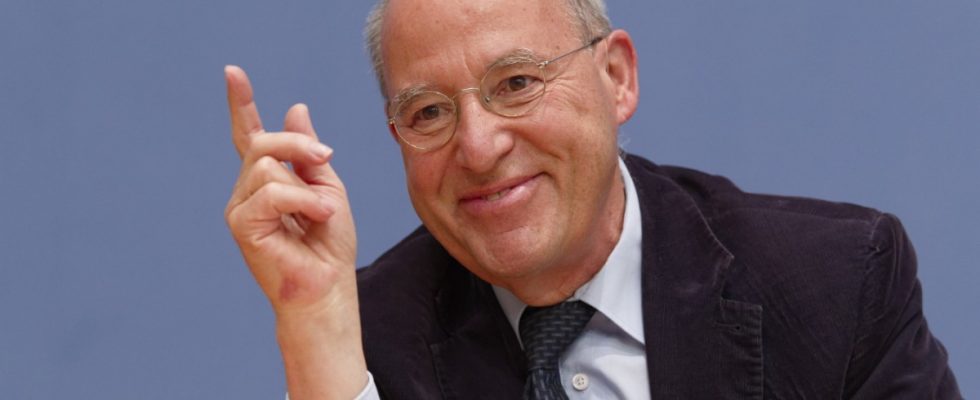The day after faction leader Dietmar Bartsch’s memorable announcement of his retirement, a personnel debate began on the left that has what it takes to become even more memorable. It is a personnel debate with reversed signs. In this debate, which has so far mainly been conducted behind the scenes, for once there are not too many candidates fighting for too few leadership positions. Rather, it seems that there are too many vacancies for too few interested people.
No matter who you talk to that day afterwards in the left-wing faction, they all say the same thing: Phew, I can’t think of anyone who could do that now.
Inherent in this beginning is an end
The parliamentary group of the Left is currently leaderless in three respects. In addition to Bartsch, not only has his previous co-group leader Amira Mohamed Ali announced that he will no longer be available for the board election scheduled for September 4th. Jan Korte, who was considered Bartsch’s natural successor for many years, also wants to withdraw from management responsibility. Korte was previously the first parliamentary secretary and therefore highly influential. A successor solution is now urgently being sought for him as well.
The left faction is therefore facing a complete new beginning. But the old toilet calendar saying that there is magic in every beginning is not valid in this case, because the faction is also on the verge of its complete demise. Inherent in this beginning is an end. It is expected for the day when Sahra Wagenknecht has finally decided whether to leave the group with her entourage – and thus liquidate it, as it is called in technical jargon. In short: The left is looking for applicants for three ejection seats by the grace of Sarah. Do you have to be surprised that the field of candidates is manageable?
Perhaps it is even smaller than manageable. A faction insider says that if he applies the exclusion principle to the 39 deputies and removes everyone who either doesn’t have a majority or doesn’t feel like it, then he ends up with zero.
Complicated power arithmetic
At first glance, the most conclusive solution would of course be if party leader Janine Wissler were to also take over the leadership of the parliamentary group. In contrast to Martin Schirdewan, with whom she leads the party, she sits in the Bundestag. Wissler has not completely ruled that out recently, but her hesitant attitude seems to have good reasons. In order not to damage herself permanently as party leader, she would certainly only reach for the parliamentary group chair if she knew for sure that she would also be elected. You need 20 votes for that. And there are great doubts in the faction that they would get it together without any problems.
This has to do with the special power arithmetic. The faction can be roughly divided into three competing to hostile camps. First there are the people from Wagenknecht, also known as “the wild 13”. Then there are the so-called movement leftists, who tend to be young, urban and climate-moved, to which Wissler also belongs and who are called “the crazy ones” in circles of the first group. And finally the remaining third, whose identity is based primarily on being equally annoyed by the other two thirds. Among other things, the old PDS guard around Bartsch and Gregor Gysi is attributed to this group, as well as some free-floating wingless ones.
Whoever wants to get 20 votes in the board election would have to get at least half of another camp behind them. Mathematically, it is currently most likely that this person comes from the third group.
Susanne Ferschl’s name keeps coming up. The deputy leader of the parliamentary group from Bavaria has always stayed out of factional fights as much as possible and could be a consensus candidate. But she seems to have already signaled her disinterest internally. The Leipzig member of parliament Sören Pellmann, who once declared that he did not want to compete against Bartsch, is considered halfway ambitious. He doesn’t have to do that anymore.
Caren Lay should have a stable majority against her
Pellmann is also considered a tad too close to Wagenknecht to have a realistic chance. Caren Lay, who once wanted to be group leader but lost to Mohamed Ali in a fight vote, is likely to have a stable majority against her, which she considers too left-wing. The quite popular, but also a bit inconspicuous Christian Görke from Brandenburg trust some to inherit Korte as Parliamentary Managing Director. But the big lead role? The trust rate drops rapidly. The parliamentary group could certainly agree on Petra Pau. But why should Pau give up her position as Bundestag Vice President to grab one of the most thankless jobs currently available in Berlin?
You can hardly say it, but some people do it behind closed doors: Gysi! Perhaps the smallest common Gregor that the left still has at the moment. However, Gregor Gysi is 75 years old and that’s not the only reason why his confidants consider it almost impossible that his ego is big enough to take such a small career opportunity.
If nobody wants to (or can’t) take over the game in Skat, then a Ramsch is knocked out. The day after Bartsch, it looks a bit like the left-wing faction in the German Bundestag is heading for a junk game with 39 players.

